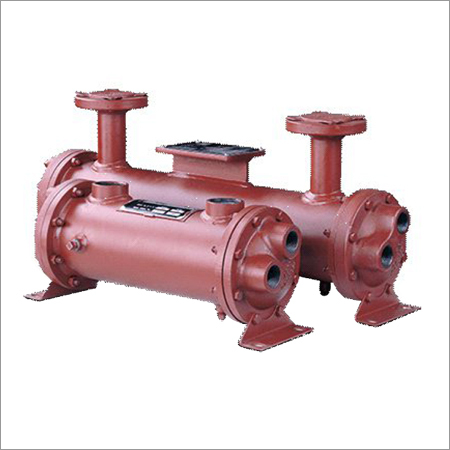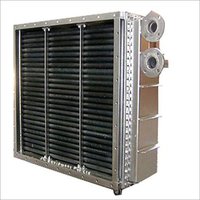Heat Exchangers
Product Details:
- Product Type Heat Exchangers
- Usage For Industrial Use
- Color Peach Color
- Condition New
- Structure Plate Heat Exchanger
- Voltage 240 Volt (v)
- Click to View more
Heat Exchangers Price And Quantity
- 7000 INR/Unit
- 1 Unit
Heat Exchangers Product Specifications
- New
- Peach Color
- For Industrial Use
- Plate Heat Exchanger
- Heat Exchangers
- 240 Volt (v)
Heat Exchangers Trade Information
- 1 Unit Per Day
- 1 Days
- Wooden Box
- All India
Product Description
A heat exchanger is a device used to transfer heat from one fluid to another while preventing the two from intermingling. The three main types are shell and tube heat exchangers, air-cooled finned tube heat exchangers and plate heat exchangers. Generally, there is a metal wall partitioned between the two fluids that acts as a conductor. A hot solution flowing on one side of the barrier transfers its heat to a cooler solution flowing on the other side. Thermal energy only flows from the hotter to the cooler in an attempt to reach equilibrium. The surface area of a heat exchanger affects its speed and efficiency; the larger a heat exchanger surface area, the faster and more efficient the heat transfer.
Heat exchangers are typically constructed of steel, titanium, copper, bronze, Brass, stainless steel, aluminum or cast iron. One of the biggest problems heat exchanger manufacturers have to prevent is corrosion, which is common due to the constant flowing of liquid. Unfortunately, this is very difficult to avoid. To help prevent this, tubing must be resistant to general corrosion, pitting, stress-corrosion cracking (SCC), selective leaching and oxygen cell attack in service. Some heat exchanger designs use fins to provide greater thermal conductivity, which also helps.
Whether in commercial or industrial use, heat exchangers are vital as energy and money saving devices since most mechanical, chemical and energy systems requires heat transferal of some sort.
Custom heat exchangers perform a crucial role in the design, operation and maintenance of heating and air-conditioning systems, vehicle design, power plants, refrigeration, chemical and industrial engineering systems. They are also important in settings such as food processing, industrial engineering processes, pharmaceutical, pulp and paper and the steel industry. All power generation industries need them. Other industries that use heat exchangers include aerospace, chemical, marine, semiconductor, petrochemical, electronic, automotive, water treatment facilities and textiles. Heat exchangers are useful to almost everyone.
IEC Make Shell & Tube Heat Exchangers remains the industry standard in ultimate value and long-term reliability. This proven fixed & floating tube sheet shell & tube heat exchanger offers the cost effectiveness that comes with having a highly standard design, while easily providing for various options to meet
Specific customer requirements.
Sizes: 3 to 30 diameter; 12 to 192 length, Shells: Carbon Steel or SS 304, Tubes: 1/4, 3/8, 5/8,7/8", , 1", 1.25", 1.5" & 2 diameter tubes available in Copper, Admiralty, 90/10 Cu Ni, or SS 304 Straight tube or U-Tube configurations, Baffles: Precision punched Carbon Steel, Brass, or SS 304, Heads: Cast heads available in iron, SS 304, or bronze; Fabricated heads available in Steel, SS 304, or 90/10 Cu-Ni. Flow: Available in 1-pass, 2-pass, and 4-pass designs. Codes: Commercial Standard (non-code) ASME , TEMA-C, IS-2825.
Specification
| Layout | Horizontal |
| Usage/Application | Industrial |
| Application | Pharmaceutical industry,Mining & Construction Industry |
| Surface | Coated |
| Material | MS |

Price:
- 50
- 100
- 200
- 250
- 500
- 1000+






